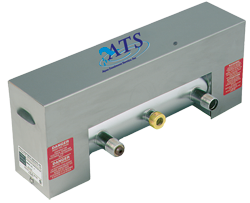Ultraviolet Water Sterilizers in Maryland
Providing UV Water Filtration Throughout Annapolis, Glenwood & More!
An ultraviolet light sterilizer is a water filtration process for your home. The system uses UV light to kill bacteria and microorganisms in your drinking water. Because there are no chemicals involved in the process, it’s a safe and effective option for filtering your home’s drinking water.
Since 1979, our family-owned water filtration company has been cleaning and sterilizing the water in homes and businesses throughout Howard, Anne Arundel, Montgomery, and Baltimore counties. Our team of experts can find the right solution for you!
Are you ready to make the switch over to filtered water with an ultraviolet water sterilizer? Contact Water Doctor today or keep reading to learn more about the benefits of a UV water filtering system!
Request a Free Water Analysis Today!
How UV Water Treatment Works
As water flows through the ultraviolet light sterilizer, it is exposed to UV light from special lamps. The frequency of the UV rays kills the bacteria by destroying the DNA of the microorganisms. This means that the microorganisms can no longer duplicate. This process is effective against viruses, E. coli, bacteria, and other harmful microorganisms, and it is also good for killing harmful microorganisms that are resistant to chlorine.
The Benefits of UV Water Treatment
There are many benefits of using an ultraviolet light sterilizer for filtering your water:
- It’s a convenient filtration option. The system doesn’t require much maintenance besides annual check-ins.
- As mentioned before, ultraviolet light sterilizers are safe. This is because your water isn’t exposed to harsh chemicals while filtering out contaminants.
- The process leaves your water odorless and tasteless. The last thing you want your water filtration system to do is make your water smell or taste bad. Ultraviolet light sterilizers will not affect the taste or smell of the water.
- Because the water flows straight through, the whole process is rather quick. Unlike reverse osmosis, ultraviolet light sterilizers don’t have a holding tank. Therefore, the overall process is faster.
- Some other systems filter out the contaminants and discard the wastewater. This system doesn’t create any wastewater because all of the water that goes through is sterilized and ready for drinking. It is environmentally friendly because it helps to conserve water.
- The entire system is completely automatic, so you don’t have to worry about keeping track of anything.
- UV sterilizers kill bacteria 24/7 without bleach, which creates “disinfection byproducts.” Healthy water without chemicals is better for hair and skin!
Install an Ultraviolet Light Sterilizer in Your Maryland Home
Call Water Doctor to install an ultraviolet light sterilizer for your home’s drinking water supply. It’s a great option for everyone and especially effective for homes with well water. Keep you and your family healthy and safeguarded against bacterial contamination with an ultraviolet light sterilizer.
Frequently Asked Questions
How often should I change the bulb for a UV water sterilizer?
Most manufacturers and experts recommend you replace your bulb about once a year. More specifically, the average UV lamp has an estimated life span of 9,000 hours, or approximately 375 days.
Isn’t exposure to UV light bad for you?
Heavy exposure to UV light isn’t good for your skin for much the same reason it’s great for sterilizing water: UV radiation damages the delicate structures of microorganisms and cells and makes them nonfunctional or ineffectual.
Fortunately, it doesn’t leave any toxic residue or contaminate the water it treats, so you shouldn’t worry about any negative effects of UV water sterilizers.
Do UV sterilizers change how my drinking water tastes or smells?
UV sterilizers aren’t going to cause a substantial change to the taste of your water because they don’t remove the types of contaminants that change water flavor.
If you have strange-tasting water, we recommend sulfur removal and reverse osmosis to make your water more pleasant to drink.
Can I use a UV water sterilizer if I have a water softener?
Yes, the two technologies are compatible — your water should be softened and then sterilized because hard water can reduce your UV sterilizer’s effectiveness.
Will using a UV water sterilizer affect my water flow/pressure?
UV lights do need contact time to effectively kill bacteria and thus contain flow restrictors. Sizing the unit to match your water flow needs in the house can address this, so a properly sized UV light would not affect flow or pressure.
Proudly Serving The Following
Maryland Counties
Anne Arundel | Howard | Baltimore | Frederick | Montgomery | Carroll | Charles | Calvert | Queen Anne's | Harford
Anne Arundel | Howard | Baltimore | Frederick | Montgomery | Carroll | Charles | Calvert | Queen Anne's | Harford




